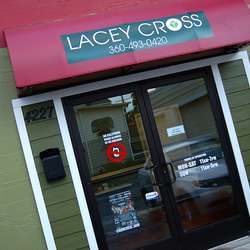Medical Marijuana Merchant Faces at Least Five Years for Bad Timing and 'High-Roller Lifestyle'
A federal jury convicts Lance Gloor of something hundreds of uncharged competitors openly did.

On Friday a federal jury in Tacoma convicted Lance Gloor of growing and conspiring to distribute marijuana. The jury, which failed to reach a verdict on a money laundering charge and acquitted Gloor of of possessing a gun in furtherance of a drug trafficking crime, found that the distribution conspiracy involved at least 100 kilograms, which triggers a five-year mandatory minimum. The maximum is 40 years.
Since Gloor openly ran medical marijuana dispensaries in Lacey, Washington, and the Key Peninsula, there was never any doubt about his guilt under federal law. But it remains a bit mysterious why the feds targeted Gloor while leaving hundreds of other medical marijuana entrepreneurs alone.
"This was done out in the public," Gloor's attorney, Karen Unger, reminded the jury, noting that the outlets he ran paid state taxes, cut payroll checks, and even took credit cards for a while. Evidently Gloor was a little too conspicuous for the Justice Department's taste. According to The Olympian, prosecutors emphasized that "Gloor used profits from the dispensaries to support a lavish lifestyle, including a $500,000 house in Gig Harbor that he leased under a rent-to-own agreement and a several-month stint living at a local hotel." After moving to Las Vegas, Assistant U.S. Attorney Marci Ellsworth said, Gloor "kept skimming the profits to support his high-roller lifestyle."
After the 2011 raids that led to Gloor's indictment, Jenny Durkan, then the U.S. attorney for the Western District of Washington, said "we will not prosecute truly ill people or their doctors who determine that marijuana is an appropriate medical treatment." But that does not mean the DOJ will stand by while people make money by providing marijuana to patients, Durkan emphasized. "Laws of compassion were never intended to protect brash criminal conduct that masquerades as medical treatment," she said. "In determining how to focus our drug enforcement resources, we will look at the true nature and scope of an enterprise, and its impact on the community. We will continue to target and investigate entities that are large-scale commercial drug enterprises, or that threaten public safety in other ways. Sales to people who are not ill, particularly our youth, sales or grows in school zones, and the use of guns in connection with an enterprise all present a danger to our community."
Those criteria were flexible enough that Durkan could justify targeting pretty much any operation. "These locations claimed to be medical marijuana 'non-profit dispensaries' operating under state law, when in fact they were for-profit businesses generating millions of dollars in gross revenues," the U.S. Attorney's Office said in a statement issued after Gloor's conviction. But all of Washington's dispensaries were indisputably criminal enterprises under federal law, many of them turned a profit, and all of them operated under debatable interpretations of state law—initially as "designated caregivers" for their customers, later as networks of "collective gardens" with rotating memberships. If Gloor had lived in a cheaper house or driven a cheaper car, he might not been one of the unlucky few medical marijuana suppliers to feel the wrath of the U.S. Justice Department.
Had Gloor not been indicted, he could have been one of the medical marijuana merchants competing for licenses from Washington's Liquor and Cannabis Board, which under a legalization initiative approved in 2012 regulates pot shops serving recreational consumers as well as patients. The DOJ is leaving those businesses unmolested, even though they are doing exactly what Gloor was accused of doing—i.e., exchanging contraband for money. It looks like Gloor's real crime, in addition to his "high-roller lifestyle," was bad timing.


Show Comments (38)